Can Texas public universities remove protesters from campus? First Amendment experts explain
After the University of Texas called in police — some descending on campus on horseback, others clad in riot gear — to disperse a student-organized pro-Palestine protest April 24, arresting 57 people, a heated debate ensued over whether the school protected, or violated, the principles of the First Amendment.
The nonpartisan free-speech advocacy group FIRE slammed the school's actions on April 24 as "flagrantly unconstitutional," writing that UT "appears to have preemptively banned peaceful pro-Palestinian protesters due solely to their views rather than for any actionable misconduct" in a letter to university President Jay Hartzell.
The same group — which is known for its defense of conservative and religious groups on college campuses— did not take the same posture regarding the arrests Monday of 79 students who refused to leave a pro-Palestinian encampment on the UT South Mall. A First Amendment attorney for FIRE told the Statesman that the school had the authority to arrest protesters who had created and fortified an encampment on campus.
"If we're talking about peaceful protesters that are simply exercising their free speech rights, that's protected. But when it comes to installing tents and fixtures and staying overnight, that's a rule that would be permissible to enforce under the First Amendment," Zach Greenberg, who is also a senior program officer at FIRE, told the American-Statesman in a phone interview. Greenberg qualified the making of encampments as "civil disobedience."
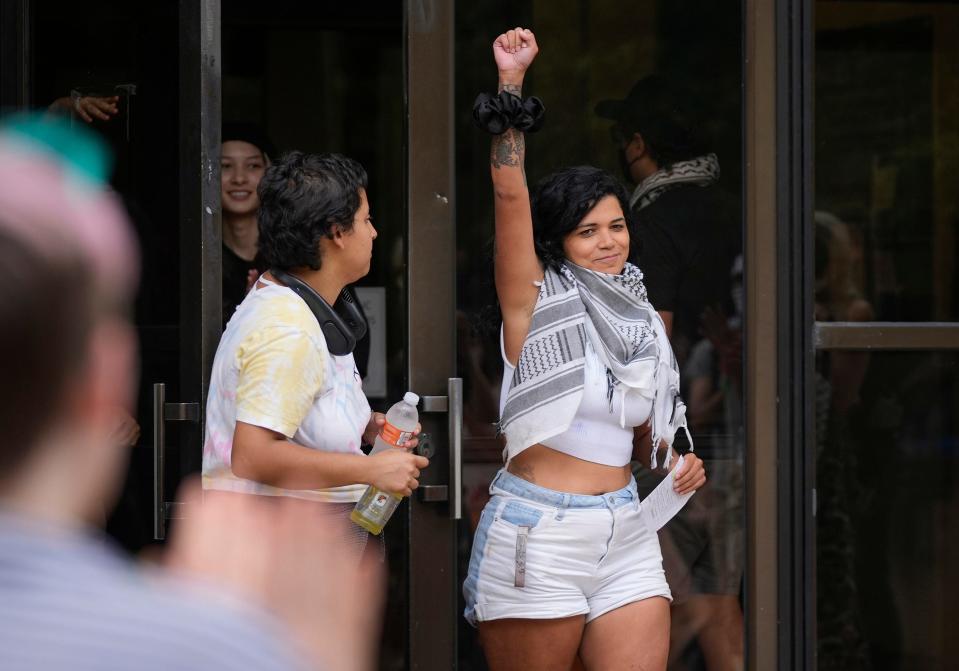
The new batch of mass arrests has further complicated a debate that has left many confused about whether and in what circumstances public universities can send in law enforcement officials to break up demonstrations.
So what authority does UT, and other Texas public universities, have to stop protests on its campus? And what rights do protesters have? The Statesman spoke with five First Amendment experts to learn what legal dynamics are at play on campus and how they might apply to the UT-Austin protests.
Click to jump to a section:
Can Texas public universities cancel protests in advance?
What kind of speech does the First Amendment protect at public universities?
Who can protest at Texas public universities?
Students and nonstudents have equal rights to engage in lawful protests at public universities in Texas.
In 2019, Republican Gov. Greg Abbott signed a law designating outdoor spaces at public universities “traditional public forums,” affording protesters — including nonstudents — the highest level of First Amendment protections.
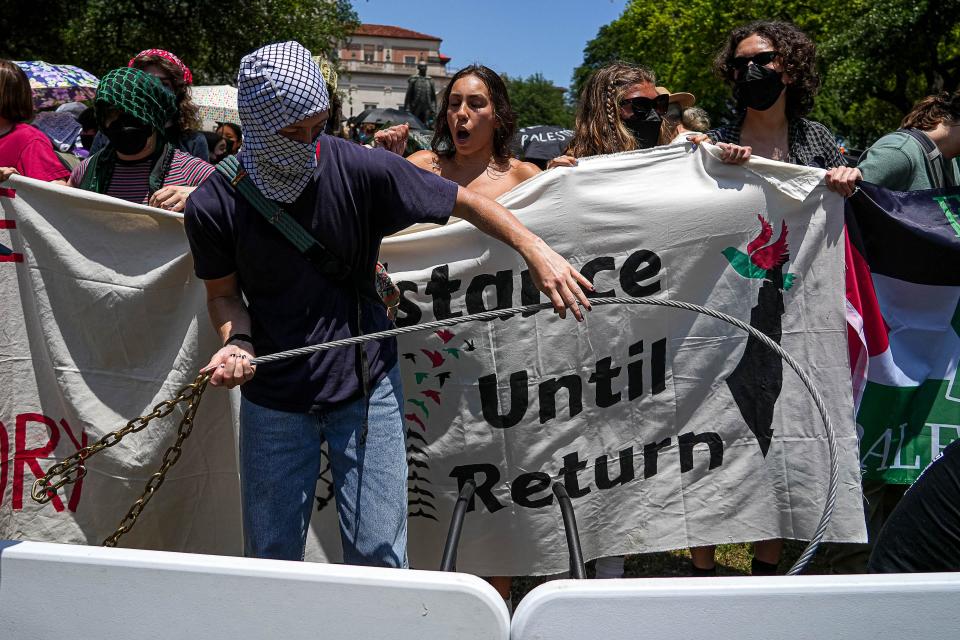
The law, Senate Bill 18, permits “any person” to engage freely in speech activities on outdoor areas of campus “so long as the person’s conduct (a) is not unlawful and (b) does not materially or substantially disrupt the functioning of the institution.”
UT’s vice president of legal affairs, Amanda Cochran-McCall, cited SB 18 in a video the school produced to celebrate Free Speech Week six months ago.
"Texas actually allows members of the public, just like our university community, to come onto campus and use our common outdoor areas for speech activity," she said.
Can Texas public universities cancel protests in advance?
On April 23, UT officials told the Palestine Solidarity Committee that the group was not permitted to hold a march and teach-in planned for the following day because the group had "declared intent to violate our policies and rules, and disrupt our campus operations."
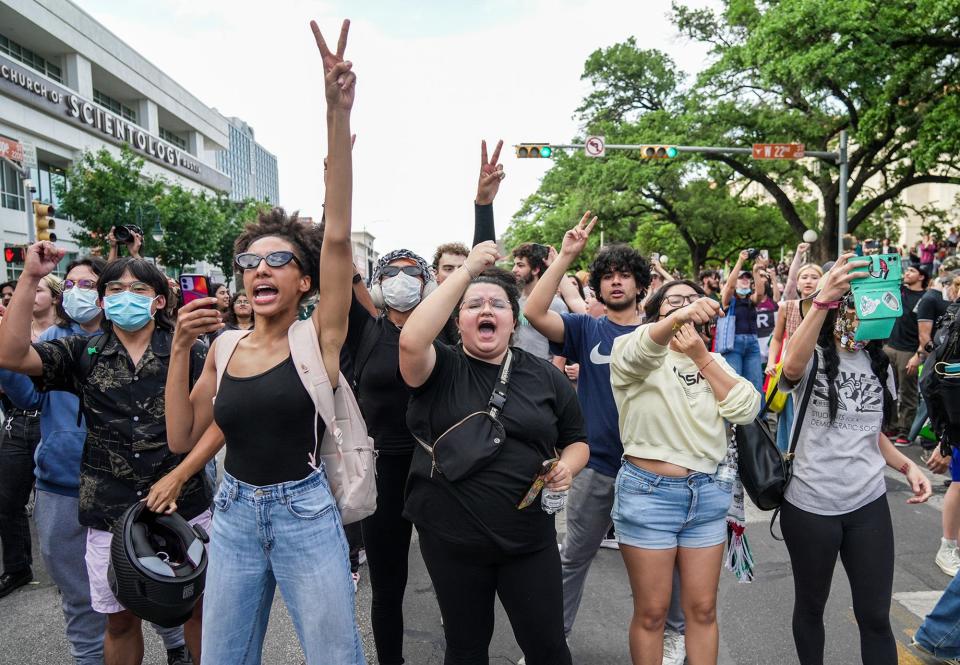
The letter cited an Instagram post in which the group invited students to wear masks and to "occupy the lawn" on Wednesday. It also cited a post from the group's account stating that students would "take back our university" "in the footsteps of our comrades" at schools including Columbia University.
"Simply put, The University of Texas at Austin will not allow this campus to be 'taken,'" wrote Aaron Voyles and Melissa Jones-Wommack, administrators in the Dean of Students' office.
Hartzell reiterated that the protest was canceled in a statement published Thursday to justify the response from state, city and university police.
It isn't clear whether the university had the right to cancel the protest in advance or to order students to leave, however.
Amy Sanders, a UT law and journalism professor who specializes in First Amendment law, said the right to protest on UT's campus means dispersal orders from police are not necessarily lawful justifications for blanket arrests.
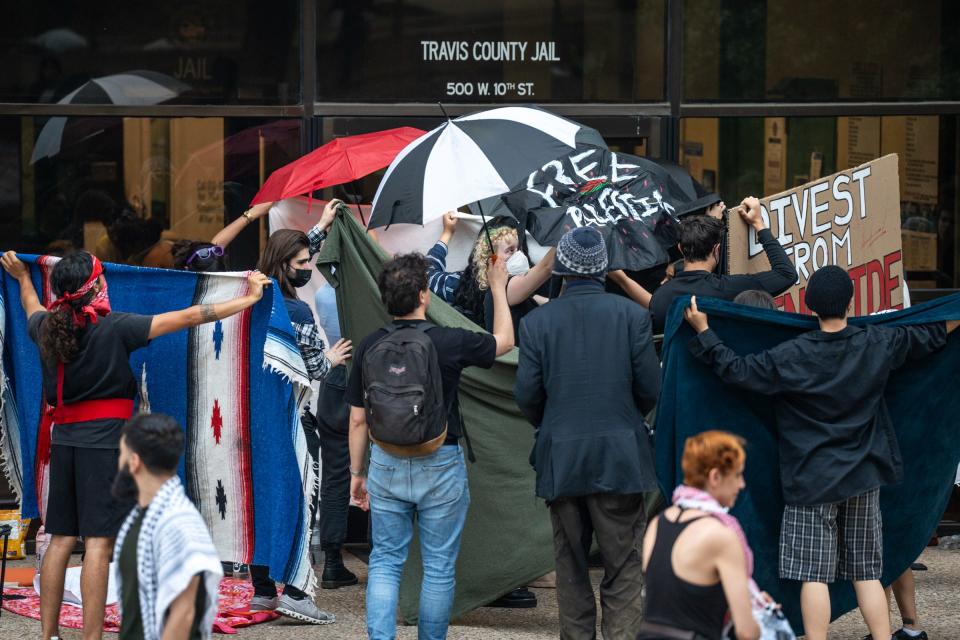
"When we're talking about dispersal orders, those orders have to be aimed at people who are engaged in unlawful activity," Sanders told the Statesman in a phone interview. "An order to disperse when students have a right to be on their public university campus is not necessarily a lawful order."
Several experts told the Statesman that the enforcement of a preemptive cancellation raises questions about prior restraint, which occurs when a government entity prevents speech from happening before it occurs.
Thomas Leatherbury, a law professor and director of the First Amendment Clinic at Southern Methodist University, said the burden is on administrators to provide evidence justifying their decision.
"It's hard to justify preemptive cancellation because you're predicting that there will be violations of the law," Leatherbury said in a phone interview Tuesday. "The First Amendment doesn't really favor those kinds of predictive measures based on what you think is going to happen."
More: 'We asked for help': Text messages reveal why DPS was called to help patrol UT protest
What kind of speech does the First Amendment protect at public universities?
In a widely shared social media post April 24, Abbott implied pro-Palestinian demonstrations are "antisemitic" and supported the protesters' arrest.
"These protesters belong in jail," Abbott wrote in response to a video of the protest at UT on April 24. "Antisemitism will not be tolerated in Texas. Period."
Arrests being made right now & will continue until the crowd disperses.
These protesters belong in jail.
Antisemitism will not be tolerated in Texas. Period.
Students joining in hate-filled, antisemitic protests at any public college or university in Texas should be expelled. https://t.co/XhLlQdvUl0— Greg Abbott (@GregAbbott_TX) April 24, 2024
And though neither UT officials nor police have publicly accused demonstrators at the April 24 and Monday protests — when dozens were arrested both days for criminal trespassing — of using hate speech, only the use of unprotected speech could justify an arrest of a protester who is otherwise following the law and other reasonable restrictions.
The U.S. Supreme Court has established that the First Amendment protects all speech except incitements of lawlessness; defamatory language; words of obscenity or indecency; and “fighting words,” which include imminent threats, according to Cornell University's Legal Information Institute. "Obscenity" refers to a very narrow category of pornographic speech and imagery, such as child pornography.
The First Amendment protects speech that many consider hateful, wrong or offensive, including on campus, Cochran-McCall said in UT's Free Speech Week video.
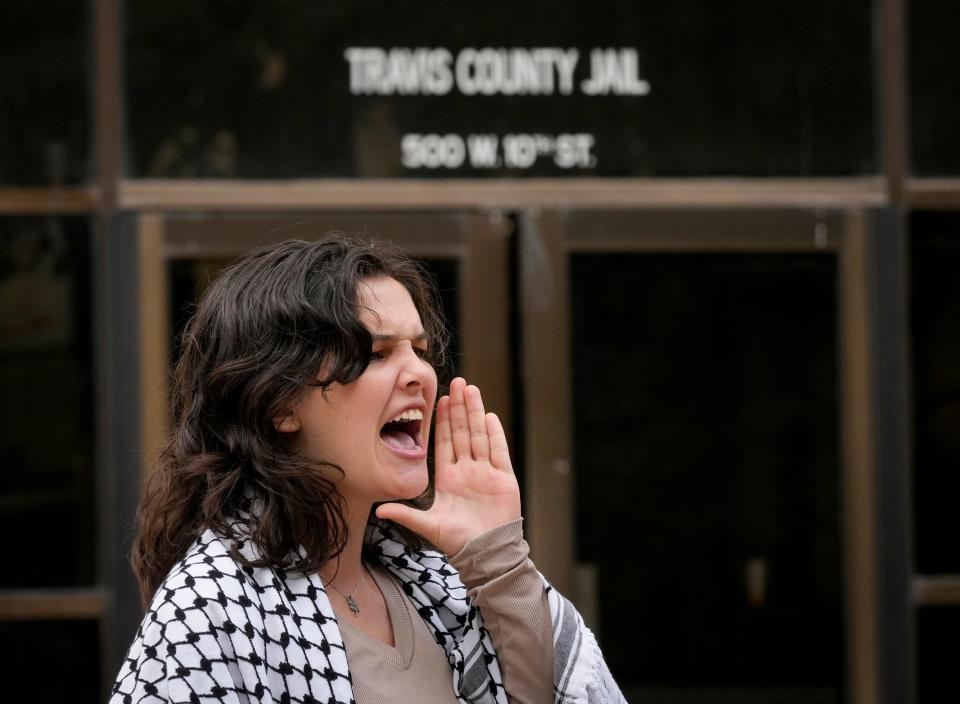
"Hate speech is not a category of speech the government can restrict, so if someone wanted to set up a table on our campus outside and share racist or sexist views, the Constitution still protects it," she said.
Cochran-McCall, a First Amendment lawyer, also emphasized that "hate speech" is not a well-defined term, making its protection more important.
"Imagine if the government, at the whim of a political party, could decide at any time what constitutes hate speech and then just start arresting people for that," she said. "I don't think that's a place we want to be."
What restrictions can campuses impose on protests? Are police allowed to arrest people for breaking campus rules?
As Cochran-McCall noted, a campus protest is not a "free-for-all." In addition to enforcing the law, public universities can impose reasonable "time, place and manner restrictions" for protests, several experts told the Statesman. These restrictions must be content-neutral, meaning they cannot discriminate against a certain point of view.
Steven T. Collis, a UT professor who specializes in First Amendment law, said an example of a reasonable restriction is a rule prohibiting demonstrators from blocking sidewalks or passageways. An unreasonable restriction would be something that prevents a protest from being heard.
"If the university says you have to be in you have to be in one particular place and that place is a parking garage three blocks from campus where no one's going hear you, that would be considered unreasonable," he said.
If students violate reasonable restrictions, law enforcement officers generally have the authority to remove or arrest protesters, Collis said. However, the use of police force must be proportionate, which means that officers should not use more violence than is necessary.
Whether every UT rule is a reasonable restriction is up to interpretation.
Sanders said the university's rule forbidding masks at protests would not withstand First Amendment scrutiny because U.S. courts have established strong protections for anonymous speech.
"We have a long history in our country of allowing and supporting anonymous speech," she said. "So a rule that requires students not to wear masks when they're speaking would violate the constitution."
Leatherbury was also skeptical that UT's mask rule would justify breaking up a nonviolent protest. However, he said a court would ultimately need to decide on the issue.
UT's rule against encampments is more likely to be viewed as a reasonable justification for removing protesters, the SMU professor and practicing First Amendment lawyer told the Statesman on Tuesday.
"Camping adds a different dimension to (a protest), especially because of Texas' ban on public camping," he said. "It also implicates different safety and health concerns."
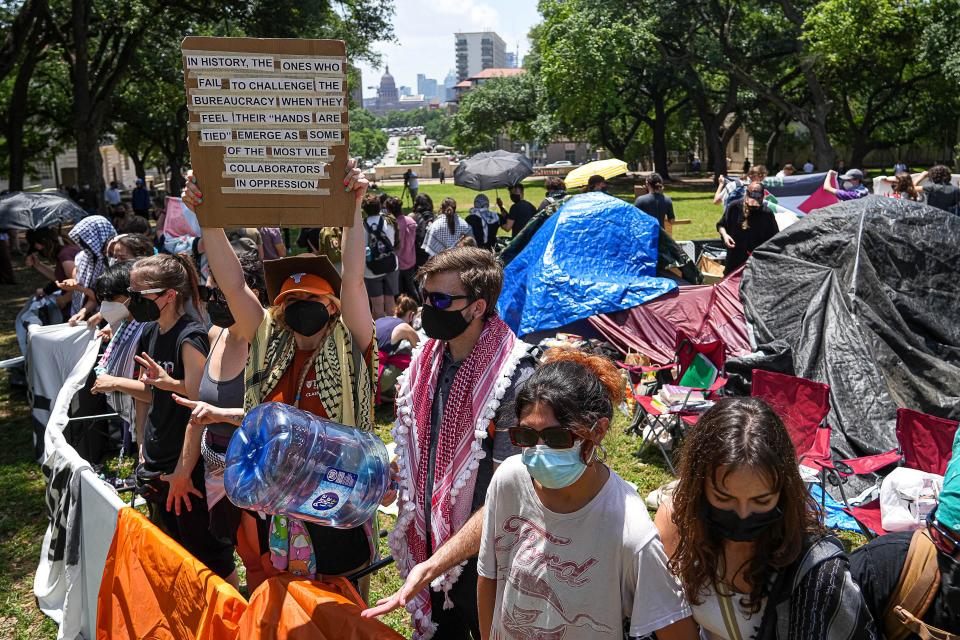
The Legislature in 2021 banned the creation of residential camps "without the effective consent of the officer or agency having the legal duty or authority to manage the public place," though no protesters have been charged under that law.
In reference to noncampers at the April 24 protest, Texas ACLU attorney Brian Klosterboer told the Statesman that arrests of nonviolent individuals engaging in free speech activities are not justified except in cases of "compelling government interest."
“The default is that people have a right to peacefully assemble and protest,” Klosterboer said in a phone interview. “Only in extreme circumstances where there is a real threat to public safety, or some other compelling governmental interest, can the police arrest people for simply being there (and) protesting.”
What's next for arrested protesters?
Whether protesters arrested during demonstrations at UT over the past week face any criminal charges and possible convictions will depend on Travis County Attorney Delia Garza's discretion.
The charges for those arrested April 24 have been dropped, but as of Thursday afternoon, she had not announced whether her office will prosecute the 79 demonstrators who were jailed after refusing to leave the encampment Monday.
The Travis County sheriff's office said Tuesday morning that 78 of those arrested Monday were charged with criminal trespass, and one person received an additional charge of obstructing a highway or passageway. Kristen Dark, sheriff's office public information officer, also said one person was charged with interfering with public duties.
Cochran-McCall did not respond to the Statesman's questions about whether the university had a right to break up protests that took place over the past week.
Have further questions? Email me at bwagner@statesman.com.
More: Abbott's condemnation of UT protesters contrasts with his 2019 stance on campus free speech
This article originally appeared on Austin American-Statesman: Can Texas public universities remove protesters from campus? Not always.

